At Pittsburgh Seminary, we seek to participate in God’s ongoing mission in the world by seeing and getting to know people as our neighbors. Challenged by Jesus’ parable of the Good Samaritan and inspired by Mr. Fred Rogers ’62, who sang, “I have always wanted to have a neighbor just like you!”, I am writing this blog to introduce you to some of my neighbors—students in our Doctor of Ministry (D.Min.) Program, for which I am honored to serve as the director. They work with diverse populations, whom they have come to see as neighbors and care for lovingly. I hope by the end of this series, you will get to know our Doctor of Ministry students, their ministries, as well as see those whom they serve as siblings in Christ, as neighbors near and far.
I would like to introduce you to my neighbor Mary Beth Tipton, who has been a United Methodist Deacon since 2008. She serves as director and campus minister at the Wesley Foundation at The University of Virginia’s College at Wise, Va., and she is part-time pastor of two small congregations: Crab Orchard UMC and Tacoma UMC. Her D.Min. project “Walking the Way Together: Rural Clergy Discipleship in Community” involved research with clergy serving in nearby rural and isolated communities and how those who serve part-time and multi-vocationally were seeking connection with God, nurturing that connection through spiritual development opportunities. She lives with her husband and son in Southwestern Virginia, very close to Kentucky and Tennessee—mere miles away from the Cumberland Gap through which Daniel Boone traveled long ago.
–The Rev. Dr. Donna Giver-Johnston, Director of the Doctor of Ministry Program at Pittsburgh Theological Seminary
Won’t You Be My Neighbor? Belonging While Exploring
When I consider who my neighbors are, I am inclined to think of people who show mercy and are moved by compassion. These are qualities Jesus attributes to the neighbor who assists a victim of crime left suffering in the street. This help is not given without cost. The Good Samaritan gives time, effort, and money to aid someone in need. There is also an inherent risk to personal reputation. A neighbor participates in risk-taking love for fellow human beings.
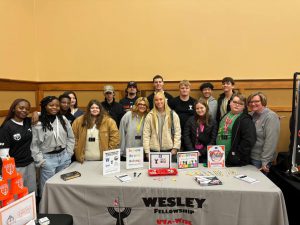
My ministry neighborhood includes a population of students, faculty, and staff. On a college campus, the diversity of backgrounds, beliefs, and perspectives is vast. People from different cultures, with unique experiences and holding distinct views, form a dynamic community in shared space. College is the first time many students are exposed to people with different values and backgrounds than their own. Education, both inside and outside the classroom, expands knowledge about who people are and can be. Pursuing higher education is often a catalyst for identity exploration. Seeking autonomy does not negate the human desire to belong. The campus ministry I serve offers an intentional invitation to students, faculty, and staff, regardless of religious background, to be part of an open and inclusive Christian community of spiritual exploration. A safe haven for exploration includes integrity, vulnerability, and sacrifice. Like Fred Rogers, I frequently ask those in my neighborhood, “won’t you be my neighbor?”
Seeking autonomy does not negate the human desire to belong . . . . A safe haven for exploration includes integrity, vulnerability, and sacrifice.
Leaning in to Relationships
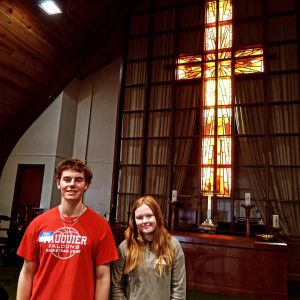
My neighbors include anyone who seeks to explore or wrestle with questions about God and what it means to be a disciple of Jesus Christ. Some of my neighbors engage out of curiosity about Christian community, one different from their own. Others grapple with confusion as they encounter the many diverse interpretations of what it means to be Christian. Some seek to be shaped in relationship with God, learning how their gifts and vocation can be used in the world. Some of my neighbors harbor animosity toward Christianity, due to past hurt or negative experiences with the faith. My role as a campus minister involves listening to their experiences, recognizing their needs, extending mercy and compassion, and providing support as they navigate their struggles. Additionally, I have a unique opportunity to recognize God’s presence and activity in their lives and gently encourage them to do the same.
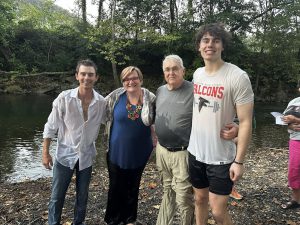
The story of Jacob wrestling with God serves as a powerful metaphor for the struggles many of my neighbors on campus face as they contend with questions of identity, spirituality, and purpose. Just as Jacob’s encounter with God was a transformative experience that led to a new understanding of himself, many of my neighbors wrestle with their own sense of self and faith. This wrestling often involves moments of uncertainty and vulnerability, as they question who they are and what they believe. Like Jacob, they face the challenge of confronting deeply personal struggles, but also experience moments of growth and clarity. The journey requires taking the risk to open up to themselves and others, to confront difficult truths, and to lean into relationships that may challenge their assumptions. In this way, the wrestling is not only a process of personal growth, but also a call to engage with the world around them in deeper, more authentic ways. It is a gift to walk alongside and encourage my neighbors not only to notice God’s presence, but also to remain committed to the journey until they receive a blessing.
In this way, the wrestling is not only a process of personal growth, but also a call to engage with the world around them in deeper, more authentic ways.
Care Over Conformity
In my neighborhood, disillusionment and deconstruction are common struggles for people of all ages. Campus ministry is a safe environment where wrestling is welcome, one need not face struggles alone, and re-construction of core values and beliefs is permissible. Being a good neighbor does not mean working toward conformity. Being a good neighbor involves caring for those who are nearby, and recognizing God is at work within them while encouraging them to “work out [their] own salvation with fear and trembling” (Phil 2:12-13).
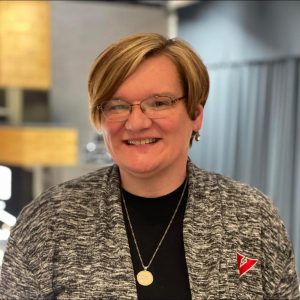 The Rev. Dr. Beth Tipton ’24 has served as director and campus minister at the Wesley Foundation at the University of Virginia’s College at Wise since 2003. She is an ordained deacon who has served as a leader at local, national, and global levels of The United Methodist Church. She believes a vital faith is an active faith, and is excited about ministry that brings people into an active relationship with God. Beth holds a Doctor of Ministry degree (Christian Spirituality cohort) from Pittsburgh Theological Seminary.
The Rev. Dr. Beth Tipton ’24 has served as director and campus minister at the Wesley Foundation at the University of Virginia’s College at Wise since 2003. She is an ordained deacon who has served as a leader at local, national, and global levels of The United Methodist Church. She believes a vital faith is an active faith, and is excited about ministry that brings people into an active relationship with God. Beth holds a Doctor of Ministry degree (Christian Spirituality cohort) from Pittsburgh Theological Seminary.
Read Next


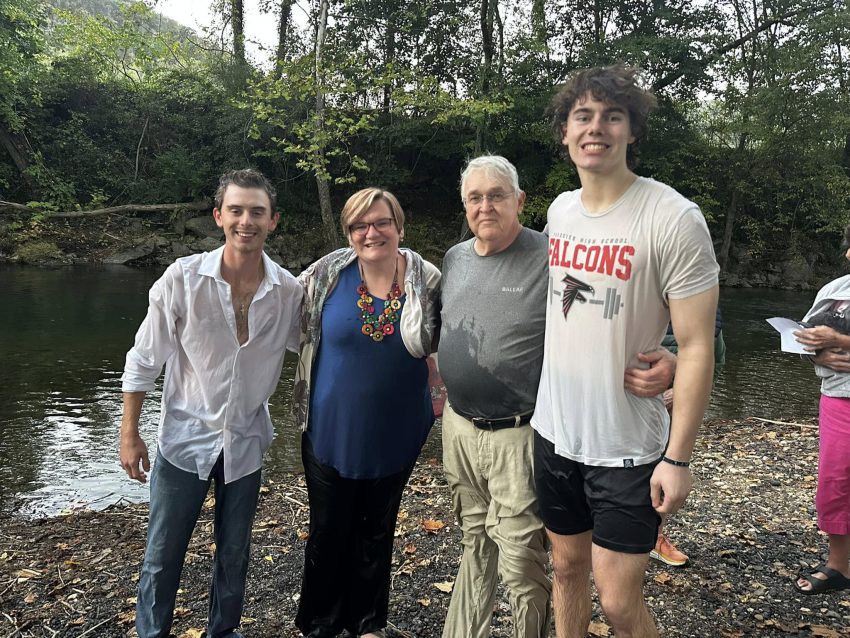

1 thought on “Who Is My Neighbor? The Rev. Dr. Mary Beth Tipton on Deconstruction, Mercy, and Risk-Taking Love”